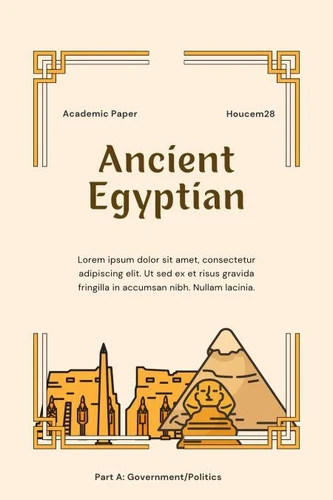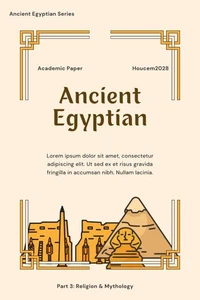Ancient Egyptian: Government/Politics. Ancient Egyptian History, #1
Par :Formats :
Disponible dans votre compte client Decitre ou Furet du Nord dès validation de votre commande. Le format ePub est :
- Compatible avec une lecture sur My Vivlio (smartphone, tablette, ordinateur)
- Compatible avec une lecture sur liseuses Vivlio
- Pour les liseuses autres que Vivlio, vous devez utiliser le logiciel Adobe Digital Edition. Non compatible avec la lecture sur les liseuses Kindle, Remarkable et Sony
 , qui est-ce ?
, qui est-ce ?Notre partenaire de plateforme de lecture numérique où vous retrouverez l'ensemble de vos ebooks gratuitement
Pour en savoir plus sur nos ebooks, consultez notre aide en ligne ici
- FormatePub
- ISBN8227078551
- EAN9798227078551
- Date de parution15/01/2025
- Protection num.pas de protection
- Infos supplémentairesepub
- ÉditeurBig Dog Books, LLC
Résumé
The central focus of these articles is the exploration of the socio-political, economic, religious, and cultural frameworks that shaped the development of ancient civilizations. These articles delve into the organizational structures, daily lives, spiritual beliefs, artistic achievements, and interactions within and between civilizations such as Ancient Egypt, Mesopotamia, Greece, Rome, and others.
They analyze how governance systems, trade networks, religious ideologies, and societal norms contributed to the identity, stability, and legacy of these societies, offering a comprehensive understanding of their contributions to human history and the evolution of civilizations over time. The study of ancient civilizations provides a comprehensive lens through which we can examine the historical, political, cultural, and technological advancements that shaped human development.
These civilizations, such as Ancient Egypt, Mesopotamia, Greece, Rome, and others, represent the foundational societies that influenced the trajectory of human progress. The main topic of the articles focuses on an in-depth exploration of these ancient societies across five major domains: government and politics, economy and trade, religion and mythology, daily life and societal structure, and art and architecture.
Together, these domains provide a holistic framework for understanding the complexity and interconnectedness of these civilizations.
They analyze how governance systems, trade networks, religious ideologies, and societal norms contributed to the identity, stability, and legacy of these societies, offering a comprehensive understanding of their contributions to human history and the evolution of civilizations over time. The study of ancient civilizations provides a comprehensive lens through which we can examine the historical, political, cultural, and technological advancements that shaped human development.
These civilizations, such as Ancient Egypt, Mesopotamia, Greece, Rome, and others, represent the foundational societies that influenced the trajectory of human progress. The main topic of the articles focuses on an in-depth exploration of these ancient societies across five major domains: government and politics, economy and trade, religion and mythology, daily life and societal structure, and art and architecture.
Together, these domains provide a holistic framework for understanding the complexity and interconnectedness of these civilizations.
The central focus of these articles is the exploration of the socio-political, economic, religious, and cultural frameworks that shaped the development of ancient civilizations. These articles delve into the organizational structures, daily lives, spiritual beliefs, artistic achievements, and interactions within and between civilizations such as Ancient Egypt, Mesopotamia, Greece, Rome, and others.
They analyze how governance systems, trade networks, religious ideologies, and societal norms contributed to the identity, stability, and legacy of these societies, offering a comprehensive understanding of their contributions to human history and the evolution of civilizations over time. The study of ancient civilizations provides a comprehensive lens through which we can examine the historical, political, cultural, and technological advancements that shaped human development.
These civilizations, such as Ancient Egypt, Mesopotamia, Greece, Rome, and others, represent the foundational societies that influenced the trajectory of human progress. The main topic of the articles focuses on an in-depth exploration of these ancient societies across five major domains: government and politics, economy and trade, religion and mythology, daily life and societal structure, and art and architecture.
Together, these domains provide a holistic framework for understanding the complexity and interconnectedness of these civilizations.
They analyze how governance systems, trade networks, religious ideologies, and societal norms contributed to the identity, stability, and legacy of these societies, offering a comprehensive understanding of their contributions to human history and the evolution of civilizations over time. The study of ancient civilizations provides a comprehensive lens through which we can examine the historical, political, cultural, and technological advancements that shaped human development.
These civilizations, such as Ancient Egypt, Mesopotamia, Greece, Rome, and others, represent the foundational societies that influenced the trajectory of human progress. The main topic of the articles focuses on an in-depth exploration of these ancient societies across five major domains: government and politics, economy and trade, religion and mythology, daily life and societal structure, and art and architecture.
Together, these domains provide a holistic framework for understanding the complexity and interconnectedness of these civilizations.








